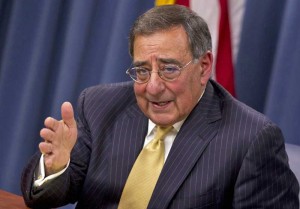Special to WorldTribune.com
WASHINGTON — The administration of President Barack Obama has cast doubts on the feasibility of an attack on Iran.
[In a debate Saturday night, several Republican candidates supported a military strike on Iran if all other efforts to stop the regime’s development of nuclear weapons failed.]

Officials said the Defense Department and military have expressed
caution over any attack on Iran’s nuclear infrastructure. They said the
Pentagon as well as the military’s Central Command argued that any
strike on Iran could threaten U.S. interests in both neighboring Iraq and
Afghanistan.
“Those consequences could involve not only not really deterring Iran from what they want to do, but more importantly, it could have a serious impact in the region and it could have a serious impact on U.S. forces in the region,” Defense Secretary Leon Panetta said.
In a briefing on Nov. 10, Panetta expressed what officials said marked strong opposition by the U.S. military for an Iranian strike in 2011. The secretary dismissed a U.S. or Israeli military operation against Iran, despite its growing nuclear weapons program.
“This [military option] ought to be a last resort,” Panetta said.
The United States was believed to have intensified a sabotage campaign
against Iran.
On Nov. 12, at least 17 soldiers from Iran’s Islamic
Revolutionary Guard Corps, including a senior commander, were killed in an
explosion in what the opposition said was a missile base west of Teheran.
The commander was identified as Hassan Moghaddam.
“No sabotage was involved in this incident,” Iranian parliamentarian
Parviz Soroori said.
Officials said the Pentagon has assessed that any U.S. air strike would
lead to massive Iranian retaliation in Iraq and Afghanistan. They said this
could harm the NATO stabilization mission in Afghanistan as well as erode
relations with Iraq amid plans to withdraw American troops by 2012.
“You’ve got to be careful of unintended consequences here,” Panetta, a
former CIA director, said.
Officials said the administration would examine additional
sanctions on Iran, particularly against energy imports and investment. They
said the military has determined that Iran, rather than Al Qaida, marked the
biggest threat to U.S. interests in the Middle East.
“Certainly we’re going to look at ways that we can ramp up economic
pressure on Iran,” State Department spokesman Mark Toner said. “We’re going
to look at unilateral actions as well.”

You must be logged in to post a comment Login